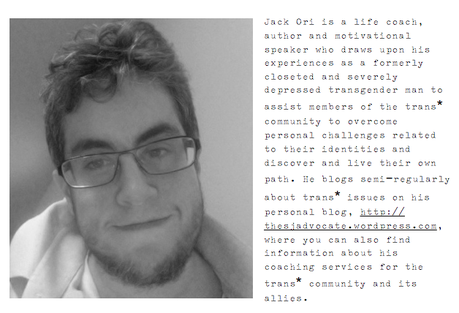By Jack Ori
Holidays can be stressful for trans people. Many people unfortunately don’t have any place to go for the holidays. Some families refuse to accept their trans children and other relatives, leaving them with no family whatsoever. Other people have a family to go to, but that family may not know the best way to support their trans members.
Trans people often feel sad and depressed if their families don’t validate their gender identities.For many of us, holiday time may mean spending several days with people who don’t validate their gender identity. Whether misgendering is intentional or not, it often feels like going into a hostile, foreign country, especially for people who have friends at home who see them as the man, woman or genderqueer person they are.
There are several constructive ways to deal with any frustration, anger or sadness related to visiting family over the holidays. Here are some of the things you may want to do after the holidays to help you regain your sense of balance and prevent future unhappy situations.
Look at What Actually Happened
It’s easy to get caught up in what didn’t happen. For example, if you were excluded from a guys-only or girls-only family outing or your parents didn’t call you by your chosen name or gender, you may get wrapped up in all of your frustration over those situations. However, it’s important to look at things more objectively for a couple of reasons.
Focusing on negatives never helps your mood. The more you think about the ways your family treated you that you were unhappy about, the bigger those incidents seem to get in your mind. In addition, you end up getting more and more frustrated.
You need to see whether your family has made any progress in order to decide what you want to do about future family get-togethers. There are some times when it makes the most sense to stay home. If your family expects you to retreat back into the closet and they haven’t made any progress towards accepting you the way you are, you may want to set some boundaries or skip some get-togethers. However, if your family is making an honest effort to get to know you and accept you, it makes little sense to sabotage that process with anger and refusal to spend time together.
You can figure out what bothered you most and work on changing those things first. Instead of wishing your family was entirely different, you can pick out things that really bother you and see what you can do about them. This helps you get everything in perspective and figure out strategies for dealing with your family.
Ways to Get Some Objectivity
It can be hard to see things clearly if you are upset or angry about the way you were treated. So, the first thing you need to do is get the feelings out so you can process them. Writing in your journal about what happened that upset you is a good first step so that you can get the emotions out of your system. After you do this, there are several things you can do to help yourself move from anger and pain to objectivity.
STEP 1: Read over what you’ve written. On a new piece of paper, make two columns. In the left column, write one-sentence descriptions of things that happened that you were unhappy about. On the right-hand side, write what you wished would happen instead. Write your left-column items in the past tense and your right-column items in the present tense. This signals your brain that your old feelings are in the past.
STEP 2: Answer the following questions for each item on the left-hand side of the page:
How bad was this incident on a scale from 1 to 10?
Was this incident an improvement from the past? How?
STEP 3: For each item on the right-hand side, answer the following questions:
How likely is it, on a scale from 1 to 10, that this behavior will occur in the next six months?
How likely is it, on a scale from 1 to 10, that this behavior will occur in the next six months if you ask for it?
What alternative behaviors would you be comfortable with?
Step 4: Write about at least one thing you enjoyed during your visit. This can help you remember that no visit is all bad.
Asserting Yourself
Once you’ve done the hard work of figuring out exactly what happened and what you need to happen, the next thing to do is figure out what to do about it. It’s often helpful to assert yourself in some way so that your family understands what bothered you and why.
It’s important to broach this subject in the appropriate manner. Try not to simply express anger and demand that things change. Instead, try using the “sandwich” method, in which you bookend needs and boundaries with positive statements. For example, you could thank your family for hosting, then say that you were upset that you were not gendered properly and end by saying that you are looking forward to an even better visit next time.
It’s also important to be sensitive to the fact that your parents and other people are transitioning too. Sometimes it’s hard to be patient when you feel like you’ve been hiding the truth about yourself your entire life and you want to be seen as you are! However, our families are not privy to our internal struggles, so our identity is all new to them. While it’s reasonable to ask to be gendered properly, make sure you make a distinction between an honest mistake and deliberately ignoring your gender identity and misgendering you.
Holidays are often difficult for people who don’t feel the close-knit family bond our society assumes everyone is “supposed” to have. For trans people in particular, family holiday time is sometimes nightmarish because it forces them to be thrust back into a world that knows them as something they are not. If you take the time to focus on what progress your family is making towards accepting you and deciding what your next step is, you can make the next family get-together easier and more enjoyable for yourself.
